Jussie Smollett convicted in Chicago: Here's the long history of his criminal case
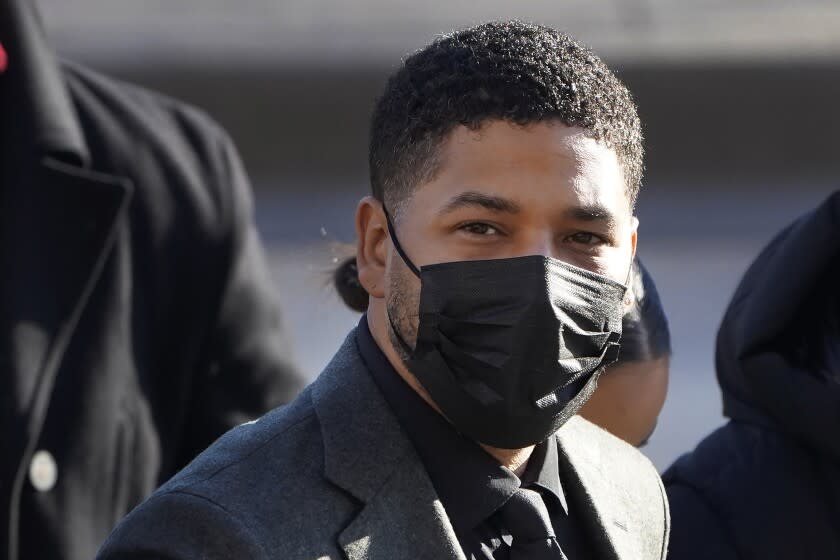
- Oops!Something went wrong.Please try again later.
- Oops!Something went wrong.Please try again later.
Former “Empire” actor Jussie Smollett was convicted Thursday in Chicago on charges that he staged an antigay, racist attack on himself nearly three years ago and then lied to police about it.
He was found guilty on five of six counts of disorderly conduct — one count for each time he allegedly lied to police in the days immediately after the alleged hate crime.
The long-standing case began Jan. 29, 2019, the day the actor said he was a victim of an attack while walking in his affluent Chicago neighborhood. He alleged to police that on that frigid night, two assailants beat him, put a rope around his neck and splashed him with a liquid.
As details emerged, however, Smollett was accused of orchestrating the attack. The actor was eventually arrested. His trial began Nov. 29 and included Smollett's testimony.
But the road to the courtroom was long and twisted. Here are some questions and answers to get you caught up on the protracted case.
Who is Jussie Smollett?
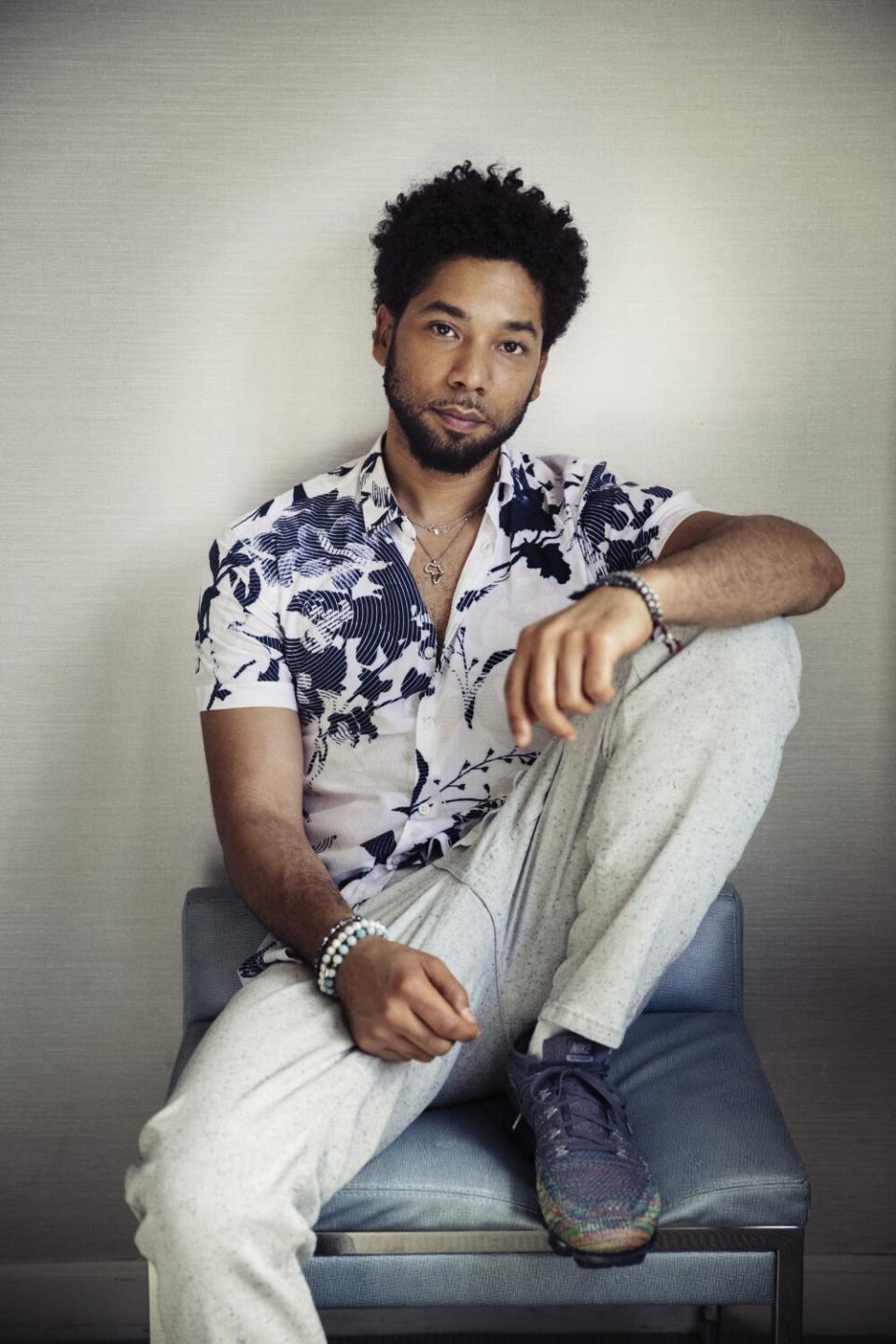
The embattled artist is a 39-year-old actor and musician whose star was on the rise when he was allegedly attacked in 2019. (He performed at the Troubadour in West Hollywood just days after the alleged assault, telling the sold-out crowd, "I'm OK.")
He's the brother of actor Jurnee Smollett ("Lovecraft Country," "Birds of Prey") and appeared in the movies "The Mighty Ducks" and "Alien: Covenant" and the "Underground" TV series. He most famously played the groundbreaking role of Jamal Lyon on the Fox series "Empire" until he was unceremoniously dismissed from the music drama as legal issues mounted around him.
The actor, whose "Empire" character was an openly gay musician, is also an out Black man and has advocated for LGBTQ rights throughout his career. That is, until public opinion turned against him and tarnished his personal and professional prospects.
Here's how it all started...
What did he say happened on Jan. 29, 2019?
Smollett claimed that around 2 a.m. Jan. 29, 2019, two people wearing masks approached him while he walked in downtown Chicago, according to initial police reports. The attackers hurled racial and homophobic slurs at him, hit him in the face, poured a bleach-like substance on him and looped a rope around his neck, a statement by the Chicago Police Department said at the time.
Authorities called the incident a possible hate crime, and Smollett, who initially received an outpouring of public support and sympathy, sustained clavicle and rib injuries and visited a hospital after the alleged attack. Even then, however, some questioned whether he had made up the story.
Appearing on "Good Morning America" in February 2019, Smollett said he was getting food from a Subway restaurant while out walking in freezing temperatures and that he had been on the phone with his manager when his attackers began shouting slurs from across the street.
They also yelled, “This is MAGA country” at him, a reference to then-President Trump’s “Make America Great Again” campaign slogan, Smollett alleged. He said he was punched and fought back. As they were tussling on the ice, his phone fell out of his pocket, but his friend was still on the line.
The entertainer also addressed doubts about inconsistencies in his story and insisted he had "been 100% factual and consistent on every level."
"Despite my frustrations and deep concern with certain inaccuracies and misrepresentations that have been spread, I still believe that justice will be served," he said in a written statement after the incident.
How did his story fall apart?
When Smollett was asked to turn over his phone records, they were redacted and were rejected as evidence because they didn’t meet “the burden for a criminal investigation,” Chicago police told The Times back then. Doubt continued to mount as surveillance video footage began to go public.
(A year later, a judge ordered Google to turn over a year’s worth of Smollett’s emails, private messages, photographs and location data to a special prosecutor looking into why prosecutors abruptly dismissed criminal charges against the actor.)
Who are the Osundairo brothers?
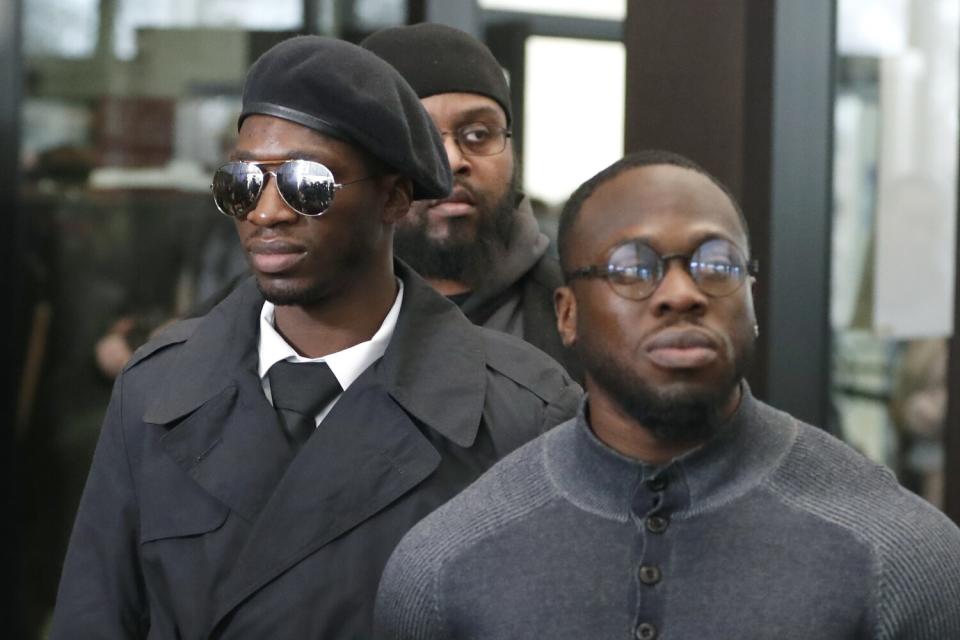
Just over two weeks after the alleged incident, Chicago authorities said the investigation into Smollett’s case had “shifted” after they questioned Olabinjo and Abimbola Osundairo, two brothers of Nigerian descent who had initially been people of interest in the case.
The Osundairos' home had been raided, and they were detained for questioning after landing in Chicago following a trip to Nigeria. The color of their skin also seemed to directly contradict Smollett's suggestion that his alleged assailants were white.
Why does Chicago law enforcement dispute Smollett's story?
While initially considering Smollett's alleged attack a possible hate crime, Chicago police concluded that he had orchestrated the incident and classified him as a suspect in a criminal investigation. Then-Chicago Police Superintendent Eddie Johnson said that the brothers confessed to the plot and that Smollett allegedly paid them $3,500 to stage the attack.
"Smollett took advantage of the pain and anger of racism to promote his career," Johnson said in a news conference at the time, adding that the actor “was dissatisfied with his salary so he concocted a story about being attacked.”
Smollett has maintained that the check — a key piece of evidence in the case — was written to Abimbola Osundairo for personal training and nutrition.
At the trial Tuesday, Chicago police detective Michael Theis, the lead investigator of the alleged attack, countered a defense attorney’s claims that Chicago police rushed to judgment in the case. He said roughly two dozen detectives clocked some 3,000 hours before concluding that the former “Empire” star had staged a hoax, the Associated Press reported.
Theis said that he initially viewed the actor as a victim of a homophobic and racist attack and that police “absolutely” didn’t rush to judgment.
When the trial began Nov. 29, Smollett's defense attorney Nenye Uche argued that Smollett was “a real victim” of a “real crime,” rejecting prosecutors’ allegation that he staged the attack after the TV studio where he worked didn’t take seriously hate mail he had received.
Uche said that the Osundairo brothers attacked Smollett because they didn’t like him and that the actor paid them for training for an upcoming music video. Uche also suggested that a third attacker was involved and told jurors that there was not a “shred“ of physical and forensic evidence linking Smollett to the crime prosecutors allege, AP reported.
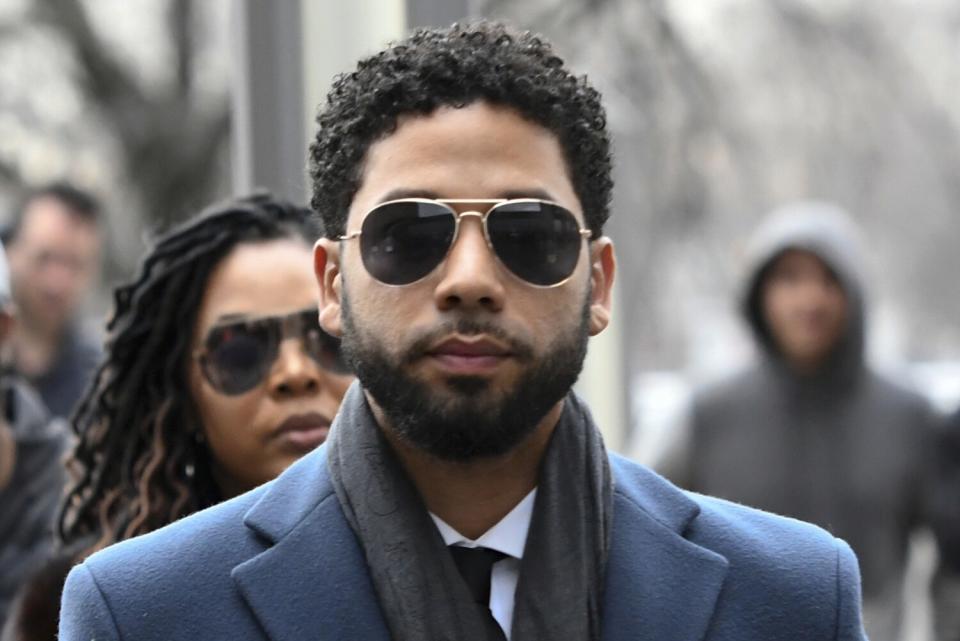
What were the initial charges against Smollett?
The Cook County state’s attorney’s office brought felony criminal charges of disorderly conduct against Smollett in February 2019 for allegedly filing a false police report and staging the Jan. 29 attack.
Smollett then turned himself in to Chicago police, was arrested and released from Cook County jail after a judge set a $100,000 bond.
Trump criticized Smollett on Twitter after hearing the news. And Kim Foxx, the Cook County state's attorney, recused herself from the investigation "out of an abundance of caution" and to "address potential questions of impartiality based upon familiarity with potential witnesses in the case," her spokeswoman said.
Then, a little more than two weeks later, a Cook County grand jury indicted Smollett on 16 counts of disorderly conduct for allegedly lying to police about being the victim of a racist and homophobic attack. The multiple counts referred to different aspects of his alleged story.
Smollett pleaded not guilty to the 16 counts and was free on a $100,000 bond.
But weren't all the charges dropped?
Yes. Briefly.
In a surprise move on March 26, 2019, Cook County prosecutors dropped disorderly conduct charges that had been filed against Smollett. Prosecutors said they reviewed the facts and circumstances of the case, including Smollett’s volunteer service in the community and his agreement to forfeit a $10,000 portion of his bond to the city of Chicago. They believed the outcome was “a just disposition and appropriate resolution to this case,” according to a statement they gave to the Associated Press.
No plea deal had been struck, and the state dismissed the charges and sealed the case.
A statement issued by the actor’s defense attorneys, Tina Glandian and Patricia Brown Holmes, said Smollett’s record “has been wiped clean of the filing.”
But that didn't sit well with law enforcement or then-Chicago Mayor Rahm Emanuel, who, along with city officials, ordered that Smollett pay $130,000 to cover the cost of the investigation. Smollett refused, and the city threatened civil action against the star, who by then had been written off of his Fox TV show.
Why was the case reopened?
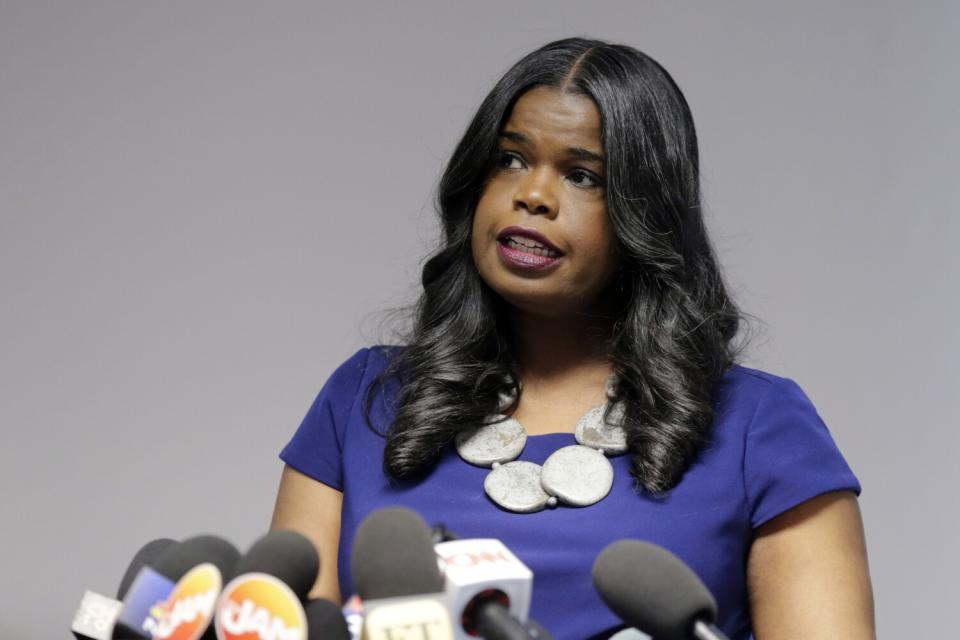
In June 2019, a Cook County judge appointed a special prosecutor, U.S. Attorney Dan K. Webb, to investigate how Smollett's initial criminal case was handled.
In February 2020, Webb said tossing the case was unjustified and restored the charges against Smollett, citing overwhelming evidence against the actor. Webb decided to further prosecute Smollett after finding "abuse of discretion and operational failures" by Foxx and her office, but concluded they did nothing criminal, according to the Associated Press.
A grand jury indicted Smollett in February 2020 on six counts of felony disorderly conduct for making false statements about the incident. Smollett pleaded not guilty to the restored, low-level charges and stood by his initial story.
Why did it take so long to go to trial?
The revived criminal case stalled as Illinois courts scaled back operations amid the COVID-19 pandemic.
Isn't there a civil lawsuit?
Yes, but civil litigation has been temporarily paused and was pending the outcome of the criminal trial, a Chicago official told the Wall Street Journal. Smollett faces a lawsuit from the city of Chicago over the money spent to investigate his case. In November 2019, his attorneys filed a counterclaim, arguing that the city is not entitled to collect any additional damages because Smollett forfeited his bail money.
What was Smollett up to since?
"They won't let this go," Smollett said in a September 2020 Instagram Live interview with Temple University professor Marc Lamont Hill. “There is an example being made, and the sad part is that there’s an example being made of someone that did not do what they’re being accused of.”
Smollett also said he had been participating in a "dog-and-pony show" swirling around the case.
Earlier this month, Smollett appeared at the premiere of "B-Boy Blues" in Harlem to promote his directorial feature film debut.
The actor appeared in court Nov. 29 when jury selection began for the criminal trial. He arrived linking arms with his sister Jurnee, and several family members watched the trial as it unfolded in the courthouse.
How did Smollett react to the verdict?
On Thursday, as the verdict was read, Smollett showed no visible reaction. Disorderly conduct is a Class 4 felony that carries a prison sentence of up to three years, but experts have said that if convicted, Smollett would probably be placed on probation and ordered to perform community service.
Smollett will be sentenced at a later date.
The Associated Press contributed to this report.
This story originally appeared in Los Angeles Times.

